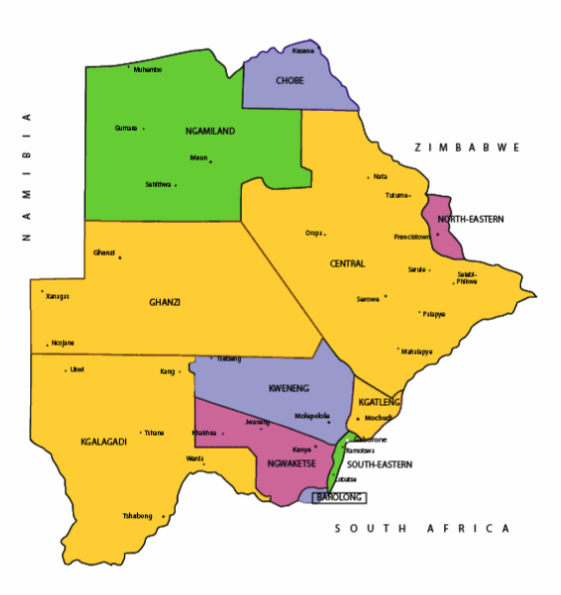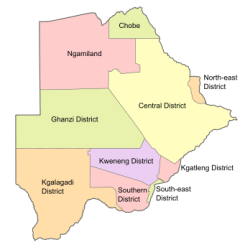Places and their polling stations in Nata-Gweta, Botswana
085 Mosetse
0445 Mosetse Primary School
0446 Kutamogoree Primary School
0447 Lepashe Primary School
0448 Mosetse Clinic Site
086 Dukwi
0449 Dukwi Primary School
0450 Tachibona Primary School
0451 Dukwi JSS
087 Nata East
0452 Lac Office
0453 Manxotae Primary School
0454 Sepako Primary School
0455 Didibakwe Cattle Crush
0456 Xharoxwacoo Cattle Crush
0457 Makongwa Primary School
0458 Roman Catholic Church
088 Sowa
0459 Tshwaane Mobile Stop
0460 Rulele Cattle Crush
0461 Malelejwe Mobile Health Stop
0462 Sowa Primary School
089 Nata West
0463 Nata Sub-Land Board
0464 Nata Primary School
0465 Maposa Primary School
0466 Xhamkhwae Mobile Stop
090 Gweta-Tsokatshaa
0467 Kutlwano JSS
0468 Gweta Community Hall
0469 Senagore Mobile Health
0470 Day Care Centre
0471 Gasebalwe Seretse Primary School
0472 Tsokatshaa Primary School
091 Gweta-Zoroga
0473 Gweta Primary School
0474 Juna Mobile Health Stop
0475 Zoroga Primary School
0476 Thabatshukudu Mobile Health Stop
0477 Gweta Kgotla
Reference: iec.gov.bw/index.php/electoral-districts/polling-stations.html
Botswana
Botswana is a country in Africa. It is topographically flat, with approximately 70 percent of its territory being the Kalahari Desert.
It is bordered by South Africa to the south and southeast, Namibia to the west and north, and Zimbabwe to the northeast.
Capital: Gaborone
Currency: Botswanan Pula
Official language: English
Population: 2.588 million (2021) World Bank
Dialing code: +267
Gross Domestic Product: 17.61 billion USD (2021) World Bank
Botswana’s ten districts are:
- Southern District
- South-East District
- Kweneng District
- Kgatleng District
- Central District
- North-East District
- Ngamiland District
- Kgalagadi District
- Chobe District
- Ghanzi District
Botswana’s councils created from urban or town councils are: Gaborone City, Francistown, Lobatse Town, Selebi-Phikwe Town, Jwaneng Town, Orapa Town and Sowa Township.






The name Botswana refers to ‘Land of the Tswana’. The landlocked, Southern Africa country is officially known as the Republic of Botswana.














Botswana is connected to Zambia through the Kazungula Bridge making it the world’s shortest border between two countries.
A country of slightly over 2 million people (2021), Botswana is one of the most sparsely populated countries in the world. It is essentially the nation state of the Tswana ethnic group, who make up 79% of the population.

About 11.6 per cent of the population lives in the capital and largest city, Gaborone.
Formerly one of the world’s poorest countries—with a GDP per capita of about US$70 per year in the late 1960s—it has since transformed itself into an upper-middle-income country, with one of the world’s fastest-growing economies.


The Tswana ethnic group were descended mainly from Bantu-speaking tribes who migrated southward of Africa to modern Botswana, living in tribal enclaves as farmers and herders.




In 1885, the British colonised the area and declared a protectorate under the name of Bechuanaland.
As colonisation stopped, Bechuanaland became an independent republic under its current name on 30 September 1966.


Since then, it has been a representative republic, with a consistent record of uninterrupted democratic elections and the lowest perceived corruption ranking in Africa since at least 1998.

The economy is dominated by mining and tourism. Botswana has a GDP (purchasing power parity) per capita of about $18,113 as of 2021, one of the highest in subsaharan Africa.


Botswana is the world’s biggest diamond producing country.
Its relatively high gross national income per capita gives the country a high standard of living and the third-highest Human Development Index of continental Sub-Saharan Africa (after Gabon and South Africa).
The country has been adversely affected by the HIV/AIDS epidemic. In 2002, Botswana began offering anti-retroviral drugs (ARVs) to help combat the epidemic.
Botswana is a member of the Southern African Customs Union, the Southern African Development Community, the Commonwealth of Nations, and the United Nations.

